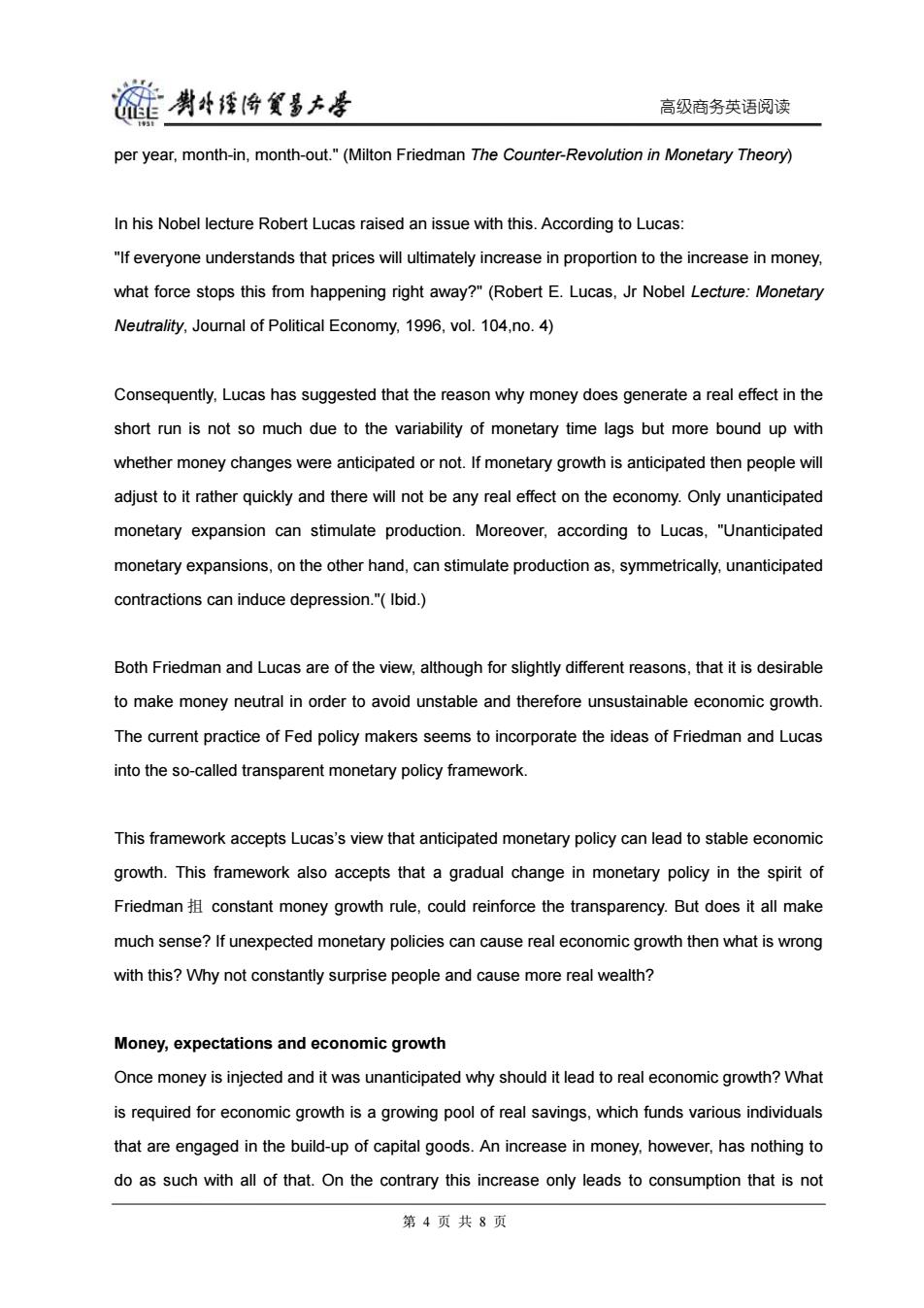正在加载图片...

碰男降贸多大是 高级商务英语阅读 per year,month-in,month-out."(Milton Friedman The Counter-Revolution in Monetary Theory) In his Nobel lecture Robert Lucas raised an issue with this.According to Lucas: "If everyone understands that prices will ultimately increase in proportion to the increase in money, what force stops this from happening right away?"(Robert E.Lucas,Jr Nobel Lecture:Monetary Neutrality,Journal of Political Economy,1996,vol.104,no.4) Consequently,Lucas has suggested that the reason why money does generate a real effect in the short run is not so much due to the variability of monetary time lags but more bound up with whether money changes were anticipated or not.If monetary growth is anticipated then people will adjust to it rather quickly and there will not be any real effect on the economy.Only unanticipated monetary expansion can stimulate production.Moreover,according to Lucas,"Unanticipated monetary expansions,on the other hand,can stimulate production as,symmetrically,unanticipated contractions can induce depression."(Ibid.) Both Friedman and Lucas are of the view,although for slightly different reasons,that it is desirable to make money neutral in order to avoid unstable and therefore unsustainable economic growth. The current practice of Fed policy makers seems to incorporate the ideas of Friedman and Lucas into the so-called transparent monetary policy framework. This framework accepts Lucas's view that anticipated monetary policy can lead to stable economic growth.This framework also accepts that a gradual change in monetary policy in the spirit of Friedman constant money growth rule,could reinforce the transparency.But does it all make much sense?If unexpected monetary policies can cause real economic growth then what is wrong with this?Why not constantly surprise people and cause more real wealth? Money,expectations and economic growth Once money is injected and it was unanticipated why should it lead to real economic growth?What is required for economic growth is a growing pool of real savings,which funds various individuals that are engaged in the build-up of capital goods.An increase in money,however,has nothing to do as such with all of that.On the contrary this increase only leads to consumption that is not 第4页共8页高级商务英语阅读 per year, month-in, month-out." (Milton Friedman The Counter-Revolution in Monetary Theory) In his Nobel lecture Robert Lucas raised an issue with this. According to Lucas: "If everyone understands that prices will ultimately increase in proportion to the increase in money, what force stops this from happening right away?" (Robert E. Lucas, Jr Nobel Lecture: Monetary Neutrality, Journal of Political Economy, 1996, vol. 104,no. 4) Consequently, Lucas has suggested that the reason why money does generate a real effect in the short run is not so much due to the variability of monetary time lags but more bound up with whether money changes were anticipated or not. If monetary growth is anticipated then people will adjust to it rather quickly and there will not be any real effect on the economy. Only unanticipated monetary expansion can stimulate production. Moreover, according to Lucas, "Unanticipated monetary expansions, on the other hand, can stimulate production as, symmetrically, unanticipated contractions can induce depression."( Ibid.) Both Friedman and Lucas are of the view, although for slightly different reasons, that it is desirable to make money neutral in order to avoid unstable and therefore unsustainable economic growth. The current practice of Fed policy makers seems to incorporate the ideas of Friedman and Lucas into the so-called transparent monetary policy framework. This framework accepts Lucas’s view that anticipated monetary policy can lead to stable economic growth. This framework also accepts that a gradual change in monetary policy in the spirit of Friedman 抯 constant money growth rule, could reinforce the transparency. But does it all make much sense? If unexpected monetary policies can cause real economic growth then what is wrong with this? Why not constantly surprise people and cause more real wealth? Money, expectations and economic growth Once money is injected and it was unanticipated why should it lead to real economic growth? What is required for economic growth is a growing pool of real savings, which funds various individuals that are engaged in the build-up of capital goods. An increase in money, however, has nothing to do as such with all of that. On the contrary this increase only leads to consumption that is not 第 4 页 共 8 页